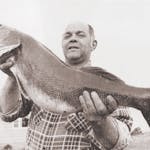Minnesota's conservation officers will be spot-checked by supervisors for compliance with new life jacket mandates as a result of policy changes stemming from last year's on-duty drowning of an experienced game warden.
In a review process that led to a settlement agreement this month, the state Occupational Safety and Health Administration (OSHA) fined the Department of Natural Resources $53,500 for three violations, according to records obtained by the Star Tribune. In follow-up talks, OSHA reduced the penalty by 45% while DNR chose to invest more than $330,000 for new water patrol safety equipment.
"We are making changes for the better,'' DNR Assistant Director Greg Salo said.
Conservation Officer Eugene Wynn Jr., 43, died April 19 on Cross Lake in Pine City while responding to an emergency call about something suspicious — possibly a person — floating in the icy water. Salo said Wynn was deploying his patrol boat for the first time of the season. In the rush to answer the call, Wynn did not don a life jacket, nor did he attach an engine-shutoff safety lanyard to his uniform as was required, OSHA documents said.
"Gene put other peoples' safety before his own,'' Salo said.
Officer Wynn and an assisting officer from the Pine County Sheriff's Department were quickly ejected from the jet-powered boat driven by Wynn when it turned sharply — possibly catching an edge while sliding sideways, Salo said. The accident happened near the Cross Lake Dam boat launch, and the sheriff's deputy was rescued. Wynn went under and didn't resurface.
Neither officer was wearing a life jacket, and Salo said Wynn's duty belt — with its sidearm, extra bullets, a flashlight and two pairs of handcuffs — was heavy enough to become an anchor.
"If you had a life jacket on, the survivability would have been very, very high,'' Salo said.
No argument
OSHA, a branch of the state Department of Labor and Industry, issued three citations against DNR and one against the Pine County Sheriff's Department. The Pine County case for not using protective equipment was settled on Feb. 3 when Sheriff Jeff Nelson agreed to a reduced fine of $2,310.
But OSHA did not back away from its $25,000 fine against DNR for Wynn not wearing a flotation device. The citation said the DNR did not furnish "a place of employment free from recognized hazards which caused or were likely to cause death or serious injury.''
DNR also was fined $25,000 for Wynn not wearing the engine shut-off lanyard. The empty boat kept running across the water and ran ashore. In settlement talks, that fine was reduced to $2,750, according to documents. Salo said DNR asked OSHA if it could use money that would otherwise go to pay fines to buy equipment and pay for training.
"OSHA was very good to work with and reasonable,'' Salo said. DNR's review of the tragedy "matched up'' with the report by OSHA, he said.
According to documents, a third citation against DNR fined the agency $3,500 for not meeting the eight-hour deadline to report a fatal work accident to OSHA. The report was made in 12 hours, and OSHA reduced the fine to $1,750.
As part of its own safety review, DNR replaced the lanyards with a wireless system that doesn't tether the boat operator to the ignition switch. Salo said the extra distance allows officers to more readily check boaters, anglers and fish in possession. If the boat operator goes overboard into the water, the engine automatically shuts off.
Earlier this month, DNR's staff of 190 game wardens was summoned to Camp Ripley for the new water safety equipment and training. At the conference, enforcement leaders introduced the officers to a new life jacket policy.
DNR always has mandated the use of life jackets, and Salo said he can't remember ever seeing a game warden in a boat or on a dock without one. But OSHA's investigator informed the agency that the policy didn't go far enough. The policy has been updated to require supervisors to observe officers and keep records of compliance — positive or negative. Because game wardens often are deployed remotely, supervisors will be required to make spot checks, Salo said.
The post-accident safety review also determined that the inflatable vests long issued to DNR game wardens work best when the air temperature is above 50, Salo said. At Camp Ripley, each officer was issued a new inflatable vest and a conventional zipper-front foam vest to wear when temps fall below 50.
Salo said the accident has not spawned litigation. Wynn, an 18-year veteran in the enforcement division at DNR, left a wife and two children. OSHA assigned investigator David Fossum to the case, and Fossum declined to comment.


